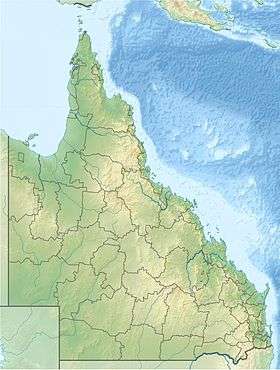Boyne River (Central Queensland)
| Boyne | |
| River | |
| Name origin: River Boyne | |
| Country | Australia |
|---|---|
| State | Queensland |
| Region | Central Queensland |
| Landmark | Boyne Valley |
| Source | Bobby Range |
| - location | southwest of Miriam Vale |
| - elevation | 371 m (1,217 ft) |
| - coordinates | 24°30′14″S 151°29′21″E / 24.50389°S 151.48917°E |
| Mouth | Coral Sea |
| - location | between Boyne Island and Tannum Sands |
| - elevation | 0 m (0 ft) |
| - coordinates | 23°55′49″S 151°21′34″E / 23.93028°S 151.35944°ECoordinates: 23°55′49″S 151°21′34″E / 23.93028°S 151.35944°E |
| Length | 125 km (78 mi) |
| Basin | 2,496 km2 (964 sq mi) |
| Reservoir | Lake Awoonga |
 Location of Boyne River mouth in Queensland
| |
| [1] | |
The Boyne River is a river located in Central Queensland, Australia.
The headwaters of the river rise in the Bobby Range, within the Great Dividing Range southwest of Miriam Vale. The river descends from the western slopes of the range and flows generally north by east parallel with the Gladstone-Monto Road through the Boyne Valley. The river enters Lake Awoonga where it flows east by north, crossed by the Bruce Highway near Riverview, and finally discharging into the Port Curtis and the Coral Sea. The river descends 371 metres (1,217 ft) over its 125-kilometre (78 mi) course, joined by thirteen tributaries from source to river mouth.[1] The mouth is located between the twin towns of Boyne Island and Tannum Sands. A bridge was built to cross the river joining the two towns in 1980.
The river is dammed by the Awoonga Dam which is the major water source for the Gladstone region. The river has a catchment area of 2,496 square kilometres (964 sq mi) of which 49 square kilometres (19 sq mi) are riverine wetlands and 17 square kilometres (7 sq mi) are estuarine wetlands.[2]
The Queensland Department of Environment and Heritage Protection consider the Boyne River to be the southern habitat extent of the saltwater crocodile. However, crocodiles can occasionally be found as far south as the Mary River.[3]
The river was named in 1823 by John Oxley[4] as it reminded him of the River Boyne in Ireland.
See also
References
- 1 2 "Map of Boyne River, QLD". Bonzle Digital Atlas of Australia. Retrieved 19 July 2015.
- ↑ "Boyne drainage basin". WetlandInfo. Queensland Government. Retrieved 18 June 2015.
- ↑ "CrocWatch". Department of Environment and Heritage Protection. 14 January 2013. Retrieved 18 January 2013.
- ↑ "Boyne River (entry 4234)". Queensland Place Names. Queensland Government. Retrieved 14 November 2015.